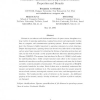Free Online Productivity Tools
i2Speak
i2Symbol
i2OCR
iTex2Img
iWeb2Print
iWeb2Shot
i2Type
iPdf2Split
iPdf2Merge
i2Bopomofo
i2Arabic
i2Style
i2Image
i2PDF
iLatex2Rtf
Sci2ools
131
click to vote
QUESTA
2007
2007
A resource allocation queueing fairness measure: properties and bounds
Fairness is an inherent and fundamental factor of queue service disciplines in a large variety of queueing applications, ranging from airport and supermarket waiting lines to computer and communication queueing systems. Recent empirical studies show that fairness is highly important to queueing customers in actual situations. Despite this importance, queueing theory has devoted very little effort to this subject and an agreed upon measure for evaluating the fairness of queueing systems does not exist. In this work we study a newly proposed Resource Allocation Queueing Fairness Measure (RAQFM). The measure, first introduced in Raz et al. (2004d), is built under the understanding that a widely accepted measure must adhere to the common sense intuition of researchers as well as practitioners and customers, and must also be based on widely accepted principles of social justice. We analyze the properties of RAQFM and provide bounds for its values. Both of these serve to intuitively under...
Related Content
| Added | 27 Dec 2010 |
| Updated | 27 Dec 2010 |
| Type | Journal |
| Year | 2007 |
| Where | QUESTA |
| Authors | Benjamin Avi-Itzhak, Hanoch Levy, David Raz |
Comments (0)

